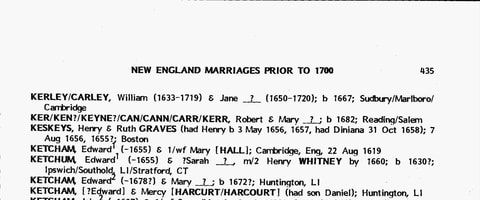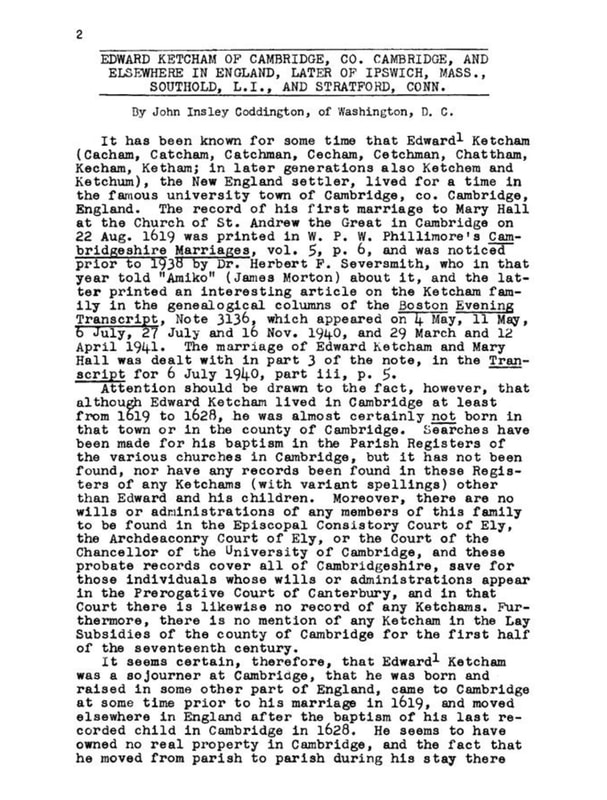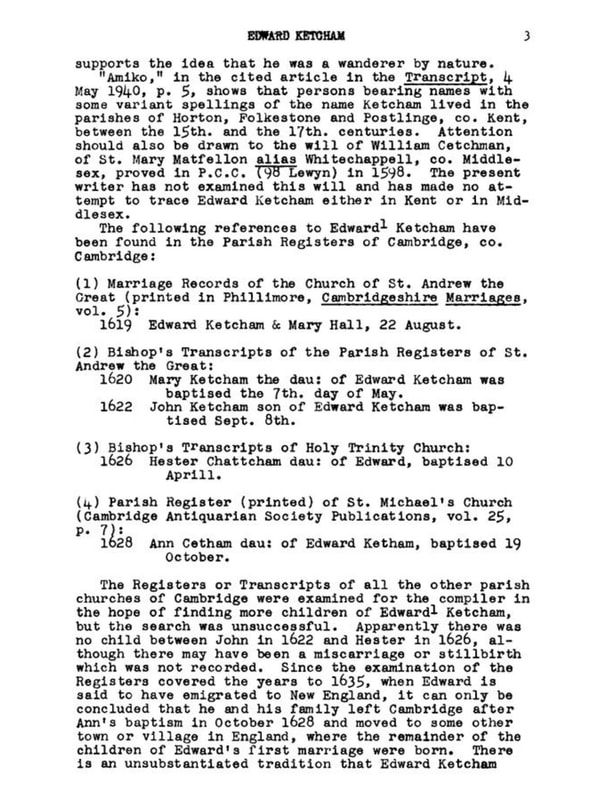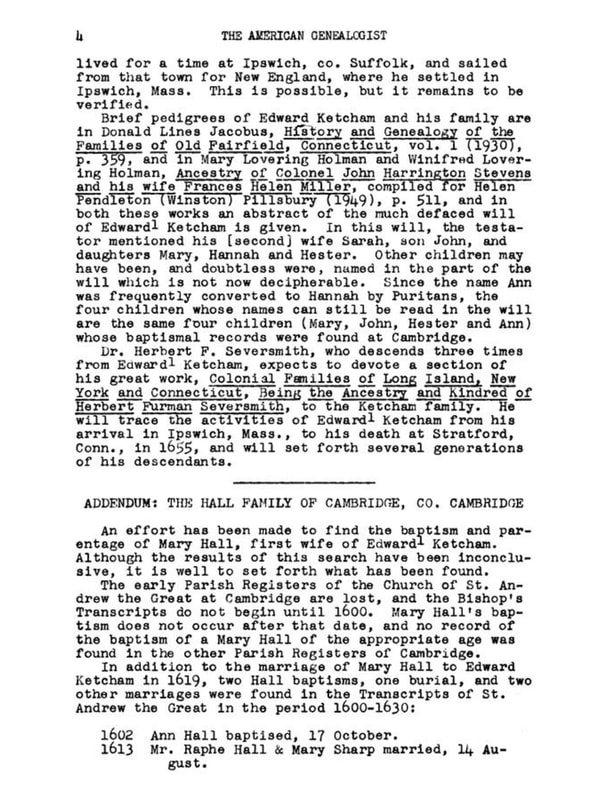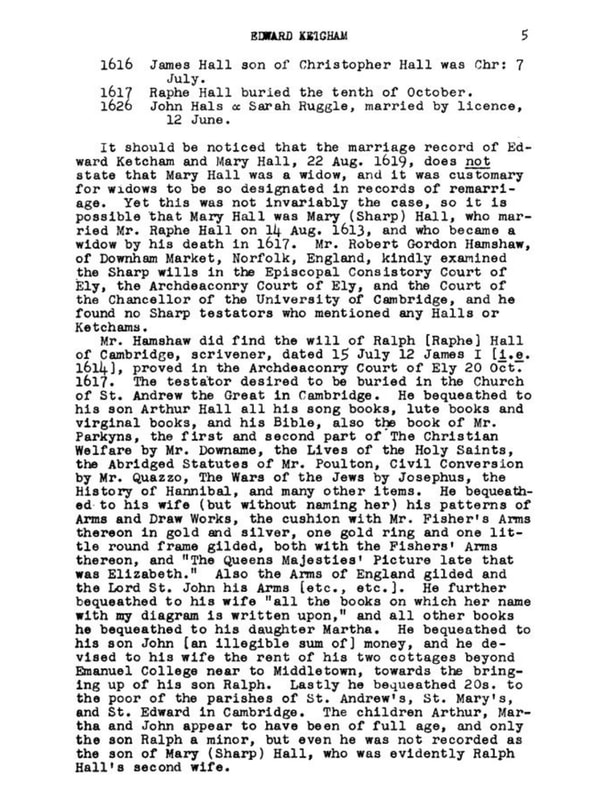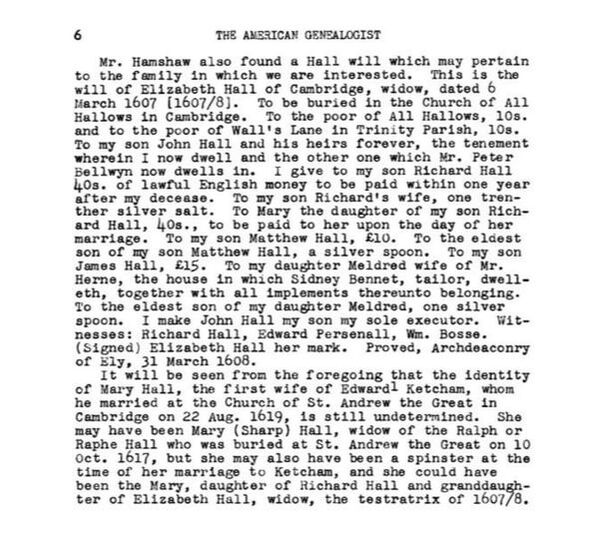Edward Ketcham
(1590 – 1655)
Mary Hall
(abt. 1600 – aft. 1640)
(1590 – 1655)
Mary Hall
(abt. 1600 – aft. 1640)
Edward Ketcham was born in County Kent, England, in 1590. His parents and any possible brothers or sisters are unknown, and there is no information about his youth. It is believed Edward lived in various parts of England during his formative years.
There is the possibility that Edward Ketcham was the son of a James Chetcham and had a number of brothers and sisters. The old English spelling of the name "Ketcham" may have been "Cheetam", "Chetham" or "Chetcham". There is no definitive evidence, however, that James Chetcham was Edward Ketcham's father. The name Ketcham itself derives from an old Kentish village known by various spelling such as Cætham, Catham or Cetham. Most derivative modern surnames are spelled Ketcham, Ketchum or Chatham.
The first definitive record of Edward Ketcham is on August 22, 1619, when, at St. Andrew’s Anglican Church, also known as the Church of St. Andrew The Great, in Cambridge, Edward married Mary Hall. Mary was from County Cambridge and was born about 1600, but her parents are unknown. Between 1620 and 1628, Edward and Mary had four children; Mary (1620), John (1622), Hester (1626) and Anna (1628). Anna’s name may have been Hannah, a common variant of the name at the time.
Edward Ketcham was a tradesman. His immigration to the Massachusetts Bay Colony occurred in 1629, Massachusetts Bay Colony on the ship Hopewell, at the start of the great Puritan migration. His family name cannot be found on any passenger list of any ship.
Edward is believed to have been in Ipswich, Massachusetts (about 30 miles north of Boston) as early as 1635, but the first reference in Massachusetts Bay Colony records to Edward Ketcham was on March 9, 1637, when he was made a freeman at Ipswich. Becoming a freeman gave him the right to vote, and being a freeman in Massachusetts at the time proved he was or had become a Puritan. Edward was still at Ipswich in 1640 as he sold land to a Mr. Boreman, and on March 3, 1640, his daughter Hester was freed from her service to John Woolridge for drunkenness and disorderly conduct on the part of Mr. Woolridge.
Sometime after 1640, Edward and his family moved to Southold, Long Island in New York. Early records of Southold are lost, but records that remain show that he was a resident there before 1651, and on August 8, 1654, William Wells bought land in Southold from Alexander Bryan; land that originally been owned by Edward Ketcham.
Edward’s wife, Mary Hall, died about the time of the family move to Southold. Edward married a second time, to Sarah Salmon, a woman about 25 years younger. Sarah Salmon was the daughter of Christopher Salmon of St. Botolph's Parish in London, England.
With Sarah, Edward had three, and perhaps four, more children; Sarah (about 1640 to 1642), Rebecca (about 1643), Joseph (about 1648) and possibly Hannah (after 1650).
Edward Ketcham was a tradesman. His immigration to the Massachusetts Bay Colony occurred in 1629, Massachusetts Bay Colony on the ship Hopewell, at the start of the great Puritan migration. His family name cannot be found on any passenger list of any ship.
Edward is believed to have been in Ipswich, Massachusetts (about 30 miles north of Boston) as early as 1635, but the first reference in Massachusetts Bay Colony records to Edward Ketcham was on March 9, 1637, when he was made a freeman at Ipswich. Becoming a freeman gave him the right to vote, and being a freeman in Massachusetts at the time proved he was or had become a Puritan. Edward was still at Ipswich in 1640 as he sold land to a Mr. Boreman, and on March 3, 1640, his daughter Hester was freed from her service to John Woolridge for drunkenness and disorderly conduct on the part of Mr. Woolridge.
Sometime after 1640, Edward and his family moved to Southold, Long Island in New York. Early records of Southold are lost, but records that remain show that he was a resident there before 1651, and on August 8, 1654, William Wells bought land in Southold from Alexander Bryan; land that originally been owned by Edward Ketcham.
Edward’s wife, Mary Hall, died about the time of the family move to Southold. Edward married a second time, to Sarah Salmon, a woman about 25 years younger. Sarah Salmon was the daughter of Christopher Salmon of St. Botolph's Parish in London, England.
With Sarah, Edward had three, and perhaps four, more children; Sarah (about 1640 to 1642), Rebecca (about 1643), Joseph (about 1648) and possibly Hannah (after 1650).
[Hannah’s existence is open to question. She is mentioned in Edward’s will, but “Hannah” was at the time was often a spelling variant of “Anna”, another of Edward’s daughters. Part of the will was destroyed and not all of Edward’s children, including Anna, are mentioned in the portion that survived.]
Sarah and Rebecca were born in Stratford, Fairfield County, Connecticut while Joseph and Hannah were born in Southold, Long Island, New York. It is not known why Edward’s location seems to go back and forth between Stratford and Southold during this time, for even though his youngest children were born in Southold, he returned to Stratford for the last years of his life.
Edward Ketcham died in Stratford, Connecticut, at age 60 on June 8, 1655. His will had been prepared the day of his death, and inventory was taken on June 9, 1655. The will was probated on June 17, 1655. Edward’s assets amounted to £90.11.6.
Edward's will is still at Fairfield County, Connecticut, was dated 8 June 1655, but the book which it is located in is over 300 years old and so fragile that no one has been allowed to look at it for many years. There are photostatic copies of his will, but they are impaired. Years ago a bottle of ink was spilled on the open Will Book. Acid ate a hole through the middle of a number of pages. It seems likely someone used acid to try to bleach the fresh ink but it ate a hole in the several pages. From the photostatic copies one would think there was a great blot on the will but it is really a hole.
As copied into the Book of Wills, Edwards' last name was spelled “Catcham". The Will of Edward including the note which preceded it, follows:
The 1st Volume of Fairfield Probate records has, at some time, had a considerable number of its leaves saturated with ink, the acid of which has destroyed the paper. The Will of ‘Edward Catcham, of Stratford, lately deceased,' was the third one recorded, and the following is all of it which remains legible:
I, Edw ... perfect ... God ... h ... Sarah ... and ... burial ... to pay ... cause to ... After my decease five shilling ... to ... John ... I give and bequeath to my three daughters ... Mary, Hann ... Hester, five shillings a piece to be p ... within six ... after my decease, the rest after my decease ... dispose ... seeth cause for the good of hers ... and Anne
Witness the day and year above written. Thomas Pell
Mr. Pell takes oath in open . . . this eighth June 1655 that . . . the last Will and Testament of Edward Catham the court approves thereof.
William Hill, Secty
According to the inventory made June 9, 1655 by Richard Barlow, Thomas Fairchild and John Wells, and approved by the court on June 19, 1655, the estate was valued at 90 pounds, 11 shillings, 6 pence. It has been stated, that the value of his estate was quite large for those days.
Edward’s second wife, Sarah, survived him, and remarried to Henry Whitney, a widower, and with Henry had one more child. Henry Whitney died in 1675. It is not known when Sarah died.
As noted above, there is no record to be found when Edward's first wife, Mary Hall, died, or when he married his second wife, Sarah Salmon. From the following court record it seems that Edward must have married Sarah by the early 1640's in time to have a daughter, Sarah, who was old enough to be courted before her father's death in 1655. In the Massachusetts Bay Colony at the time, a man could not begin to court a girl without first obtaining her parents' consent. Henry Whitney objected to having his step-daughter, Sarah, courted by young Joseph Whitman and he complained about it to the Huntington Court. Witnesses testified that before his death Edward had given his daughter Sarah permission and therefore it seems to have been none of the business of the step-father Henry Whitney.
On June 19, 1660 a complaint of Henry Whitney was presented to the Court against Joseph Whitman for stealing his daughters affections contrary to her mother's mind and using unlawful means to obtain his daughters love. A deposition of Edward Ketcham, said that he came to Joseph when he was up on mill ford and after having some discourse about this business gave Joseph Whitman his consent to have his daughter, provided he was in a settled way of living to maintain a wife. The testimony of Samuel Blackman's deposition said that he being in the company of Joseph Whitman and some others heard Edward say Joseph was a good lad and should have his daughter. The Court agreed. Young Sarah Ketcham married Joseph Whitman and he became well able to "maintain a wife" for the rate lists (tax assessment lists) in the "Documentary History of New York" (1849) show that his property was assessed for £145 and only 11 of the other 69 families in Huntington Township were worth more in 1683.
Published in: Genealogical Dictionary of New England Settlers
Ketcham, Edward, Ipswich 1635, freem. 9 Mar. 1637, may reasona. be thot. progenit. of all of the name, in our country, and therefore I regret the more that we are ign. of the circumstances of his migrat. and subseq. resid. By conject. it seems tome, that EDWARD of Stratford, wh. d. bef. 1678, was his s. whose d. Rebecca m. 14 Feb. 1678, Thomas Taylor of Norwalk. An Edward K. m. Mary, d. of Richard Harcutt, but prob. he was of L. I. yet may have been the Stratford man, wh. in his will of June 1655 ames three ds. Mary, Hannah, and Esther. HENRY, Ipswich 1638, perhaps s. of the preced. * JOHN, Ipswich 1648, prob. s. of Edward, rem. to that pt. of L. I. call. Setauket, now Brookhaven, constable, stood up for the jurisdict. of Conn. was honor. 1662, with a commiss. to make his neigh b. swear, and rep. 1664. In 1668 he rem. to Newtown, there was a man of influence to his d. 1697. Riker, 89. JOSEPH, Norwalk 1672, possib. s. of the preced. or gr.s. of Edward, m. 3 Apr. 1679, Mercy, d. of deac. Henry Lindallof New Haven, had Nathaniel, b. 23 Jan. 1680; and Sarah, 19 Feb. 1672; was in town serv. 1701. SAMUEL, Newtown, L. I. 1655, prob. br. of John, was of Setauket, freem. of Conn. 1664, and with Edward, wh. may, also, have been br. at Huntington, 1672.
Edward Ketcham died in Stratford, Connecticut, at age 60 on June 8, 1655. His will had been prepared the day of his death, and inventory was taken on June 9, 1655. The will was probated on June 17, 1655. Edward’s assets amounted to £90.11.6.
Edward's will is still at Fairfield County, Connecticut, was dated 8 June 1655, but the book which it is located in is over 300 years old and so fragile that no one has been allowed to look at it for many years. There are photostatic copies of his will, but they are impaired. Years ago a bottle of ink was spilled on the open Will Book. Acid ate a hole through the middle of a number of pages. It seems likely someone used acid to try to bleach the fresh ink but it ate a hole in the several pages. From the photostatic copies one would think there was a great blot on the will but it is really a hole.
As copied into the Book of Wills, Edwards' last name was spelled “Catcham". The Will of Edward including the note which preceded it, follows:
The 1st Volume of Fairfield Probate records has, at some time, had a considerable number of its leaves saturated with ink, the acid of which has destroyed the paper. The Will of ‘Edward Catcham, of Stratford, lately deceased,' was the third one recorded, and the following is all of it which remains legible:
I, Edw ... perfect ... God ... h ... Sarah ... and ... burial ... to pay ... cause to ... After my decease five shilling ... to ... John ... I give and bequeath to my three daughters ... Mary, Hann ... Hester, five shillings a piece to be p ... within six ... after my decease, the rest after my decease ... dispose ... seeth cause for the good of hers ... and Anne
Witness the day and year above written. Thomas Pell
Mr. Pell takes oath in open . . . this eighth June 1655 that . . . the last Will and Testament of Edward Catham the court approves thereof.
William Hill, Secty
According to the inventory made June 9, 1655 by Richard Barlow, Thomas Fairchild and John Wells, and approved by the court on June 19, 1655, the estate was valued at 90 pounds, 11 shillings, 6 pence. It has been stated, that the value of his estate was quite large for those days.
Edward’s second wife, Sarah, survived him, and remarried to Henry Whitney, a widower, and with Henry had one more child. Henry Whitney died in 1675. It is not known when Sarah died.
As noted above, there is no record to be found when Edward's first wife, Mary Hall, died, or when he married his second wife, Sarah Salmon. From the following court record it seems that Edward must have married Sarah by the early 1640's in time to have a daughter, Sarah, who was old enough to be courted before her father's death in 1655. In the Massachusetts Bay Colony at the time, a man could not begin to court a girl without first obtaining her parents' consent. Henry Whitney objected to having his step-daughter, Sarah, courted by young Joseph Whitman and he complained about it to the Huntington Court. Witnesses testified that before his death Edward had given his daughter Sarah permission and therefore it seems to have been none of the business of the step-father Henry Whitney.
On June 19, 1660 a complaint of Henry Whitney was presented to the Court against Joseph Whitman for stealing his daughters affections contrary to her mother's mind and using unlawful means to obtain his daughters love. A deposition of Edward Ketcham, said that he came to Joseph when he was up on mill ford and after having some discourse about this business gave Joseph Whitman his consent to have his daughter, provided he was in a settled way of living to maintain a wife. The testimony of Samuel Blackman's deposition said that he being in the company of Joseph Whitman and some others heard Edward say Joseph was a good lad and should have his daughter. The Court agreed. Young Sarah Ketcham married Joseph Whitman and he became well able to "maintain a wife" for the rate lists (tax assessment lists) in the "Documentary History of New York" (1849) show that his property was assessed for £145 and only 11 of the other 69 families in Huntington Township were worth more in 1683.
Published in: Genealogical Dictionary of New England Settlers
Ketcham, Edward, Ipswich 1635, freem. 9 Mar. 1637, may reasona. be thot. progenit. of all of the name, in our country, and therefore I regret the more that we are ign. of the circumstances of his migrat. and subseq. resid. By conject. it seems tome, that EDWARD of Stratford, wh. d. bef. 1678, was his s. whose d. Rebecca m. 14 Feb. 1678, Thomas Taylor of Norwalk. An Edward K. m. Mary, d. of Richard Harcutt, but prob. he was of L. I. yet may have been the Stratford man, wh. in his will of June 1655 ames three ds. Mary, Hannah, and Esther. HENRY, Ipswich 1638, perhaps s. of the preced. * JOHN, Ipswich 1648, prob. s. of Edward, rem. to that pt. of L. I. call. Setauket, now Brookhaven, constable, stood up for the jurisdict. of Conn. was honor. 1662, with a commiss. to make his neigh b. swear, and rep. 1664. In 1668 he rem. to Newtown, there was a man of influence to his d. 1697. Riker, 89. JOSEPH, Norwalk 1672, possib. s. of the preced. or gr.s. of Edward, m. 3 Apr. 1679, Mercy, d. of deac. Henry Lindallof New Haven, had Nathaniel, b. 23 Jan. 1680; and Sarah, 19 Feb. 1672; was in town serv. 1701. SAMUEL, Newtown, L. I. 1655, prob. br. of John, was of Setauket, freem. of Conn. 1664, and with Edward, wh. may, also, have been br. at Huntington, 1672.
The following story is from the "American Genealogist"Magazine Volumes 30 dated 1954:
Proudly powered by Weebly
